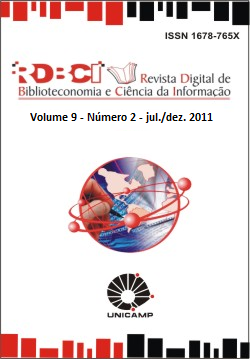Abstract
Lexicographical works accompany human development both in a technical-
scientific and cultural. In the case of dictionaries, the heterogeneity of goals,
tasks and target audience are responsible for characterizing its nature. In
information science, we analyze two dictionaries in the field: the Dicionário de
Biblioteconomia e Arquivologia (2009) and ODLIS: Online Dictionary for
Library and Information Science (2010), aiming to reflect on their positives and
negatives. The work is justified for two reasons: first by the lack of
lexicographical studies in the area, and second by the recurrent problem of
inarticulate systematization of technical dictionaries. The theory is based on the
analysis of lexical Debove-Rey (1971) that divides the organization of the
macrostructure in dictionary entries (or entries), and the microstructure
(definitions) and the slope of Günther Haensch (1982), adding the analysis of
the pre-and post-textuais.Para conclusion, it appears that every dictionary, in its
coverage and scope has an important role in the field of information science,
contributing both in research as experts in the everyday professionals. However,
some aspects of its structure and organization could be rethought in light of the
needs of those users, incorporating the precepts of lexicographical studies, yet
little widespread in Information Science.
References
AHUMADA LARA, I. Aspectos de lexicografía teórica. Granada, Universidad de
Granada: Estudios de Lengua Española, 1989.
BIDERMAN, M. T. C. A ciência da lexicografia. Alfa, São Paulo, 28, (supl.), p.1-26,1984.
______. Teoria linguística-teoria lexical e linguística computacional. 2. ed. São Paulo, SP:
Martins Fontes, 2001. (Coleção leitura e crítica).
CAMPOS SOUTO, M.; PÉREZ PASUCAL, J. I. El diccionário y otros productos lexicográficos.
In: MEDINA GUERRA, M. A. Lexicografia espanhola. Editorial Ariel: Barcelona, 2003.
CASTILLO CARBALLO, M. A. La macroestructura del diccionario.In: MEDINA GUERRA, M.
A. Lexicografia espanhola. Editorial Ariel: Barcelona, 2003.
CUNHA, M. B.; CAVALCANTI,C. R. O. Dicionário de biblioteconomia e arquivologia.
Brasília: Briquet de Lemos, 2008.
FARIA, E. M. P.Uma breve história do fazer lexicográfico. Revista Trama, v. 3, n.5, 2007.
ISQUIERDO, A. N.; ALVES, I. M. (Org.). As ciências do léxico: lexicologia, lexicografia,
terminologia. UFMS: Humanitas, 2007.
KRIEGER, M. G. et al. O século xx, cenário dos dicionários fundadores da lexicografia brasileira:
relações com a identidade do português do Brasil. Alfa, São Paulo, v.50, n.2, p. 173-187, 2006.
MEDINA GUERRA, M. A. Lexicografia espanhola. Barcelona: Editorial Ariel, 2003.
NUNES, J. H. Diccionários no Brasil: análise e história do século XVI ao XIX. São Paulo, SP:
Fapesp; São José do Rio Preto, SP: Faperp, 2006.
REITZ, J. ODLIS: Online: Dictionary of. Library and. Information Science. EUA: Libraries
Unlimited, 2004.Disponível em: <http://lu.com/odlis/index.cfm>. Acesso em: 05 out.10.
SABLAYROLLES, J.-F. Le sentiment neologique. In : Colóquio: os estudos lexicais em diferentes
perspectivas, 4., 2010, São Paulo. Projeto TermNeo: Faculdade de Filosofia, Letras e Ciências
Humanas: Universidade de São Paulo, 2010. (Mini curso-apresentação oral).

This work is licensed under a Creative Commons Attribution 4.0 International License.
Copyright (c) 2011 Jessica Camara Siqueira






